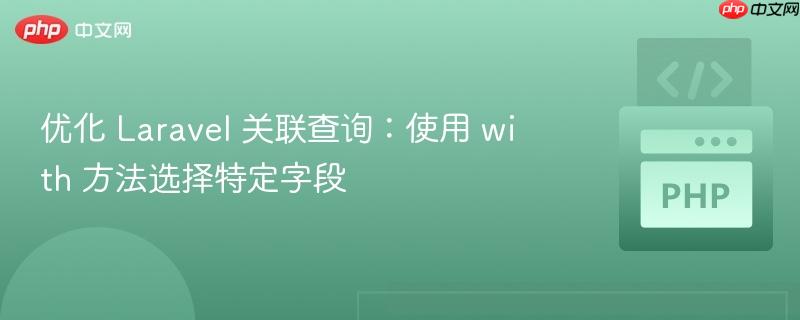
在 laravel 项目中,当我们需要从主模型(例如 a)获取数据,并同时获取其关联模型(例如 b)的特定信息时,常见的做法是定义 eloquent 关系。然而,如果不当处理,这可能导致性能问题,尤其是所谓的 n+1 查询问题。
考虑以下模型结构:
模型 A (App\Models\A)
namespace App\Models;
use Illuminate\Database\Eloquent\Model;
use Illuminate\Database\Eloquent\Relations\BelongsTo;
class A extends Model
{
protected $table = 'as'; // 假设表名为 'as'
// ... 其他属性
public function b(): BelongsTo
{
return $this->belongsTo(B::class, 'b_id');
}
}模型 B (App\Models\B)
namespace App\Models;
use Illuminate\Database\Eloquent\Model;
use Illuminate\Database\Eloquent\Relations\HasMany;
class B extends Model
{
protected $table = 'bs'; // 假设表名为 'bs'
// ... 其他属性
public function as(): HasMany
{
return $this->hasMany(A::class);
}
}当我们需要获取所有 A 记录及其关联 B 的 value 字段,但又不想获取 B 的 private 字段时,直接使用 join 语句虽然可行,但往往不如 Eloquent 的关系方法优雅和易于维护。例如,原始问题中提到的 join 方式:
// 原始的 join 方式
$a = A::join('bs', 'as.b_id', '=', 'bs.id')
->get(['as.value', 'bs.value']);这种方式虽然有效,但它绕过了 Eloquent 关系模型的便利性,并且可能在处理更复杂的关系时变得难以管理。
Laravel 的 Eloquent ORM 提供了一个强大的 with 方法来解决 N+1 查询问题,并允许我们精确控制从关联模型中加载哪些字段。这被称为“预加载”(Eager Loading)。
要获取 A 的所有记录,并预加载其关联 B 的 value 字段(同时排除 private 字段),我们可以这样操作:
use App\Models\A;
public function index()
{
$aRecords = A::with('b:id,value')->get();
return $aRecords;
}代码解析:
如果你不仅想限制关联模型的字段,还想限制主模型 A 的字段,你可以结合 select 方法:
use App\Models\A;
public function index()
{
$aRecords = A::select('id', 'b_id', 'value') // 选择 A 模型自身的字段
->with('b:id,value') // 预加载 B 模型的 id 和 value 字段
->get();
return $aRecords;
}在这个例子中,A::select('id', 'b_id', 'value') 确保了只从 A 表中获取 id、b_id 和 value 字段。
假设数据库中 as 和 bs 表有以下数据:
as 表: | id | b_id | value | |----|------|----------| | 1 | 1 | A_Value1 | | 2 | 1 | A_Value2 | | 3 | 2 | A_Value3 |
bs 表: | id | value | private | |----|---------|---------| | 1 | B_Val_X | Secret1 | | 2 | B_Val_Y | Secret2 |
使用上述优化后的控制器代码:
// App\Http\Controllers\SomeController.php
<?php
namespace App\Http\Controllers;
use App\Models\A;
use Illuminate\Http\Request;
class SomeController extends Controller
{
public function index()
{
// 优化后的查询
$aRecords = A::select('id', 'b_id', 'value')
->with('b:id,value')
->get();
return response()->json($aRecords);
}
}这将返回类似以下的 JSON 结构:
[
{
"id": 1,
"b_id": 1,
"value": "A_Value1",
"b": {
"id": 1,
"value": "B_Val_X"
}
},
{
"id": 2,
"b_id": 1,
"value": "A_Value2",
"b": {
"id": 1,
"value": "B_Val_X"
}
},
{
"id": 3,
"b_id": 2,
"value": "A_Value3",
"b": {
"id": 2,
"value": "B_Val_Y"
}
}
]可以看到,b 关联对象中只包含了 id 和 value 字段,private 字段被成功排除。
通过利用 Laravel Eloquent 的 with 方法进行预加载并精确选择关联模型的字段,我们能够以一种高效、优雅且易于维护的方式解决常见的关联数据获取问题。这种方法不仅避免了 N+1 查询问题,提升了应用程序的性能,还使得代码更加清晰和专业。在处理任何需要关联数据的场景时,都应优先考虑使用 Eloquent 的关系预加载功能。
以上就是优化 Laravel 关联查询:使用 with 方法选择特定字段的详细内容,更多请关注php中文网其它相关文章!

每个人都需要一台速度更快、更稳定的 PC。随着时间的推移,垃圾文件、旧注册表数据和不必要的后台进程会占用资源并降低性能。幸运的是,许多工具可以让 Windows 保持平稳运行。

Copyright 2014-2025 https://www.php.cn/ All Rights Reserved | php.cn | 湘ICP备2023035733号